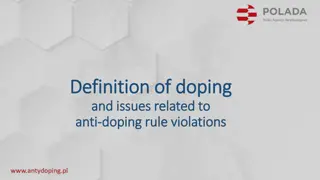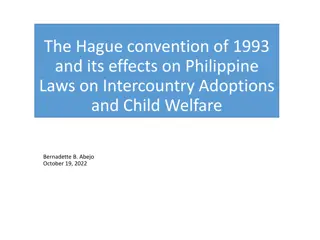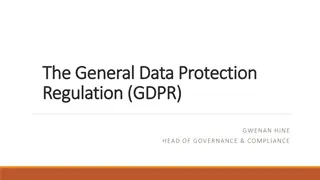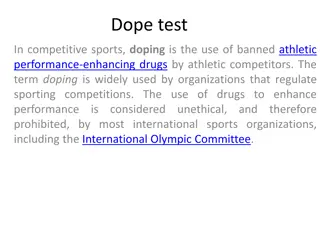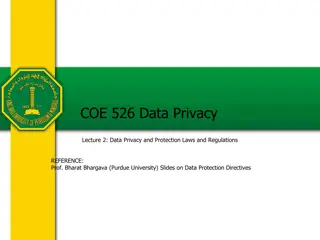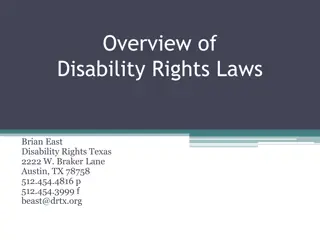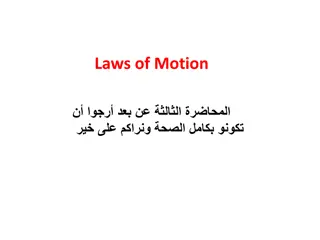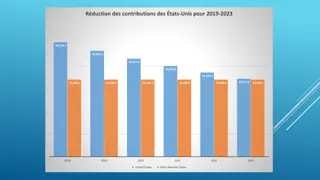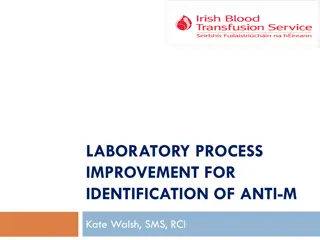Evaluation of Anti-Doping Laws and Data Protection in EU Member States
This report evaluates the anti-doping laws and practices in EU Member States in view of the General Data Protection Regulation. It includes an overview, process, main findings, and recommendations. The study involved experts and extensive research to assess the compliance of anti-doping measures with data protection standards.
Download Presentation

Please find below an Image/Link to download the presentation.
The content on the website is provided AS IS for your information and personal use only. It may not be sold, licensed, or shared on other websites without obtaining consent from the author. Download presentation by click this link. If you encounter any issues during the download, it is possible that the publisher has removed the file from their server.
E N D
Presentation Transcript
Data Protection & Anti-Doping Bart van der Sloot Senior researcher Tilburg Institute for Law, Technology, and Society (TILT) Tilburg University, Netherlands www.bartvandersloot.com
Topics (1) Overview of report (2) Process (3) Main findings (4) Recommendations
(1) Overview of the report Anti-Doping & Data Protection: An evaluation of the anti-doping laws and practices in the EU Member States in light of the General Data Protection Regulation https://publications.europa.eu/en/publication-detail/- /publication/50083cbb-b544-11e7-837e- 01aa75ed71a1/language-en/format-PDF/source-44694285
(1) Overview of the report - Ronald Leenes (TILT) - Peter McNally (Spark Legal) - Mara Paun (TILT) - Bart van der Sloot (TILT) - Patricia Ypma (Spark Legal)
(1) Overview of the report External expert group consisting of: - Prof. dr. Jos Dumortier (Time.lex) - Prof. dr. Marjan Olfers (VU University) - Prof. dr. Han Somsen (Tilburg University)
(1) Overview of the report 1. Executive summary 2. Introduction 3. Data processing under the WADA framework 4. Comparative overview of MS legislation 5. Field Study 6. Potential Tensions with the General Data Protection Regulation 7. Recommendations Annex I Template Country Reports Annex II - Fact Sheets Anti-Doping & Data Protection Annex III Survey distributed to all NADOs Annex IV Interview
(2) Process (1) Literature overiew anti-doping (2) Overview WADA guidelines, codes and standards (3) Description and analysis of the anti-doping structure/rules (4) Description and analysis sent to WADA for validation (5) Finalisation of description and analysis, resulting in chapter 3 of the report
(2) Process (1) Template for country reports designed by research team (2) Country reports on anti-doping and data protection by national experts (3) Reviewed by research team (4) Revised by national experts (5) Sent to national NADOs for validation (6) Finalised, resulting in the annex I and II of the report (7) Survey sent to all NADOs for additional information (8) Analysis of the results, see annex III
(2) Process (1) Description and analysis of the results from the country reports and surveys (2) Additional research by research team (3) Draft analysis of EU Member States law (4) Sent to NADOs for validation (5) Revised and finalised, resulting in chapter 4 of the report
(2) Process (1) Selection of countries (2) Design of interview protocol (3) Test internview with NADO (4) Finalisation interview protocol (5) Telephone interviews with NADOs (6) Physical interviews with NADOs (7) Physical interview with International Rugby Federation (8) Physical interview with WADA (9) Telephone interview with Data Protection Authority (10) Interviews with athletes and EU athletes (11) Additional background interviews with experts
(2) Process (1) Description and analysis of the interviews (2) Additional research by research team (3) Draft analysis of the implementation in practice of EU Member States law (4) Sent to NADOs and other inteview partners for validation (5) Revised and finalised, resulting in chapter 5 of the report
(2) Process (1) Overview of literature on privacy and data protection with respect to anti- doping (2) Overview of case law on privacy and data protection with respect to anti-doping (3) Description of privacy and data protection as fundamental/human rights (4) Description of Data Protection Principles in the General Data Protection Principles (5) Description of the recommondations by the Article 29 Working Party from 2008 and 2009 (6) Draft legal evaluation of the results found in chapters 3, 4 and 5 (7) Draft recommondations based on the legal analyis (8) Draft report sent to European Commission and independent experts for suggestions (9) Draft final report sent to external expert group for validation (10) Finalisation of the project
(2) Process The whole process took about 1,5 year
(3) Main findings Selection of athletes for sample collection Description of data gathering and ways to do so (IC-OOC, whereabouts, biological passport, blood, urine, breath) Alternatives to testing Testing protocols and procedures, chain of custody analysis in lab ADAMS and alternative systems Storage periods/access rights Sharing data between ADOs, sport organisations and third parties Analysis of results and sanctions Dispute resolution ADO and CAS
(3) Main findings Applicability of the General Data Protection Regulation Personal data Processed Controller On EU territory
(3) Main findings Article 4 Definitions For the purposes of this Regulation: (1) personal data means any information relating to an identified or identifiable natural person ( data subject ); an identifiable natural person is one who can be identified, directly or indirectly, in particular by reference to an identifier such as a name, an identification number, location data, an online identifier or to one or more factors specific to the physical, physiological, genetic, mental, economic, cultural or social identity of that natural person;
(3) Main findings Article 4 Definitions For the purposes of this Regulation: (2) processing means any operation or set of operations which is performed on personal data or on sets of personal data, whether or not by automated means, such as collection, recording, organisation, structuring, storage, adaptation or alteration, retrieval, consultation, use, disclosure by transmission, dissemination or otherwise making available, alignment or combination, restriction, erasure or destruction;
(3) Main findings Article 4 Definitions For the purposes of this Regulation: (7) controller means the natural or legal person, public authority, agency or other body which, alone or jointly with others, determines the purposes and means of the processing of personal data; where the purposes and means of such processing are determined by Union or Member State law, the controller or the specific criteria for its nomination may be provided for by Union or Member State law; (8) processor means a natural or legal person, public authority, agency or other body which processes personal data on behalf of the controller;
(3) Main findings Article 3 Territorial scope 1.This Regulation applies to the processing of personal data in the context of the activities of an establishment of a controller or a processor in the Union, regardless of whether the processing takes place in the Union or not. 2.This Regulation applies to the processing of personal data of data subjects who are in the Union by a controller or processor not established in the Union, where the processing activities are related to: (a) the offering of goods or services, irrespective of whether a payment of the data subject is required, to such data subjects in the Union; or (b) the monitoring of their behaviour as far as their behaviour takes place within the Union. 3.This Regulation applies to the processing of personal data by a controller not established in the Union, but in a place where Member State law applies by virtue of public international law.
(3) Main findings Article 6 Lawfulness of processing 1.Processing shall be lawful only if and to the extent that at least one of the following applies: (a) the data subject has given consent to the processing of his or her personal data for one or more specific purposes; (b) processing is necessary for the performance of a contract to which the data subject is party or in order to take steps at the request of the data subject prior to entering into a contract; (c) processing is necessary for compliance with a legal obligation to which the controller is subject; (d) processing is necessary in order to protect the vital interests of the data subject or of another natural person; (e) processing is necessary for the performance of a task carried out in the public interest or in the exercise of official authority vested in the controller; (f) processing is necessary for the purposes of the legitimate interests pursued by the controller or by a third party, except where such interests are overridden by the interests or fundamental rights and freedoms of the data subject which require protection of personal data, in particular where the data subject is a child. Point (f) of the first subparagraph shall not apply to processing carried out by public authorities in the performance of their tasks.
(3) Main findings Article 4 Definitions For the purposes of this Regulation: (11) consent of the data subject means any freely given, specific, informed and unambiguous indication of the data subject's wishes by which he or she, by a statement or by a clear affirmative action, signifies agreement to the processing of personal data relating to him or her;
(3) Main findings Article 7 Conditions for consent 1.Where processing is based on consent, the controller shall be able to demonstrate that the data subject has consented to processing of his or her personal data. 2.If the data subject's consent is given in the context of a written declaration which also concerns other matters, the request for consent shall be presented in a manner which is clearly distinguishable from the other matters, in an intelligible and easily accessible form, using clear and plain language. Any part of such a declaration which constitutes an infringement of this Regulation shall not be binding. 3.The data subject shall have the right to withdraw his or her consent at any time. The withdrawal of consent shall not affect the lawfulness of processing based on consent before its withdrawal. Prior to giving consent, the data subject shall be informed thereof. It shall be as easy to withdraw as to give consent. 4.When assessing whether consent is freely given, utmost account shall be taken of whether, inter alia, the performance of a contract, including the provision of a service, is conditional on consent to the processing of personal data that is not necessary for the performance of that contract.
(3) Main findings 2.Member States may maintain or introduce more specific provisions to adapt the application of the rules of this Regulation with regard to processing for compliance with points (c) and (e) of paragraph 1 by determining more precisely specific requirements for the processing and other measures to ensure lawful and fair processing including for other specific processing situations as provided for in Chapter IX. 3.The basis for the processing referred to in point (c) and (e) of paragraph 1 shall be laid down by: (a) Union law; or (b) Member State law to which the controller is subject. The purpose of the processing shall be determined in that legal basis or, as regards the processing referred to in point (e) of paragraph 1, shall be necessary for the performance of a task carried out in the public interest or in the exercise of official authority vested in the controller. That legal basis may contain specific provisions to adapt the application of rules of this Regulation, inter alia: the general conditions governing the lawfulness of processing by the controller; the types of data which are subject to the processing; the data subjects concerned; the entities to, and the purposes for which, the personal data may be disclosed; the purpose limitation; storage periods; and processing operations and processing procedures, including measures to ensure lawful and fair processing such as those for other specific processing situations as provided for in Chapter IX. The Union or the Member State law shall meet an objective of public interest and be proportionate to the legitimate aim pursued.
(3) Main findings Article 9 Processing of special categories of personal data 1.Processing of personal data revealing racial or ethnic origin, political opinions, religious or philosophical beliefs, or trade union membership, and the processing of genetic data, biometric data for the purpose of uniquely identifying a natural person, data concerning health or data concerning a natural person's sex life or sexual orientation shall be prohibited.
(3) Main findings 2.Paragraph 1 shall not apply if one of the following applies: (a) the data subject has given explicit consent to the processing of those personal data for one or more specified purposes, except where Union or Member State law provide that the prohibition referred to in paragraph 1 may not be lifted by the data subject; (b) processing is necessary for the purposes of carrying out the obligations and exercising specific rights of the controller or of the data subject in the field of employment and social security and social protection law in so far as it is authorised by Union or Member State law or a collective agreement pursuant to Member State law providing for appropriate safeguards for the fundamental rights and the interests of the data subject; (c) processing is necessary to protect the vital interests of the data subject or of another natural person where the data subject is physically or legally incapable of giving consent; (d) processing is carried out in the course of its legitimate activities with appropriate safeguards by a foundation, association or any other not-for-profit body with a political, philosophical, religious or trade union aim and on condition that the processing relates solely to the members or to former members of the body or to persons who have regular contact with it in connection with its purposes and that the personal data are not disclosed outside that body without the consent of the data subjects;
(3) Main findings (e) processing relates to personal data which are manifestly made public by the data subject; (f) processing is necessary for the establishment, exercise or defence of legal claims or whenever courts are acting in their judicial capacity; (g) processing is necessary for reasons of substantial public interest, on the basis of Union or Member State law which shall be proportionate to the aim pursued, respect the essence of the right to data protection and provide for suitable and specific measures to safeguard the fundamental rights and the interests of the data subject; (h) processing is necessary for the purposes of preventive or occupational medicine, for the assessment of the working capacity of the employee, medical diagnosis, the provision of health or social care or treatment or the management of health or social care systems and services on the basis of Union or Member State law or pursuant to contract with a health professional and subject to the conditions and safeguards referred to in paragraph 3;
(3) Main findings (i) processing is necessary for reasons of public interest in the area of public health, such as protecting against serious cross-border threats to health or ensuring high standards of quality and safety of health care and of medicinal products or medical devices, on the basis of Union or Member State law which provides for suitable and specific measures to safeguard the rights and freedoms of the data subject, in particular professional secrecy; (j) processing is necessary for archiving purposes in the public interest, scientific or historical research purposes or statistical purposes in accordance with Article 89(1) based on Union or Member State law which shall be proportionate to the aim pursued, respect the essence of the right to data protection and provide for suitable and specific measures to safeguard the fundamental rights and the interests of the data subject.
(3) Main findings Article 5 Principles relating to processing of personal data 1.Personal data shall be: (a) processed lawfully, fairly and in a transparent manner in relation to the data subject ( lawfulness, fairness and transparency ); (b) collected for specified, explicit and legitimate purposes and not further processed in a manner that is incompatible with those purposes; further processing for archiving purposes in the public interest, scientific or historical research purposes or statistical purposes shall, in accordance with Article 89(1), not be considered to be incompatible with the initial purposes ( purpose limitation ); (c) adequate, relevant and limited to what is necessary in relation to the purposes for which they are processed ( data minimisation ); (d) accurate and, where necessary, kept up to date; every reasonable step must be taken to ensure that personal data that are inaccurate, having regard to the purposes for which they are processed, are erased or rectified without delay ( accuracy ); (e) kept in a form which permits identification of data subjects for no longer than is necessary for the purposes for which the personal data are processed; personal data may be stored for longer periods insofar as the personal data will be processed solely for archiving purposes in the public interest, scientific or historical research purposes or statistical purposes in accordance with Article 89(1) subject to implementation of the appropriate technical and organisational measures required by this Regulation in order to safeguard the rights and freedoms of the data subject ( storage limitation ); (f) processed in a manner that ensures appropriate security of the personal data, including protection against unauthorised or unlawful processing and against accidental loss, destruction or damage, using appropriate technical or organisational measures ( integrity and confidentiality ).
(3) Main findings Article 13 Information to be provided where personal data are collected from the data subject Article 14 Information to be provided where personal data have not been obtained from the data subject Article 15 Right of access by the data subject Article 16 Right to rectification Article 17 Right to erasure ( right to be forgotten ) Article 18 Right to restriction of processing Article 20 Right to data portability Article 21 Right to object Article 22 Automated individual decision-making, including profiling
(3) Main findings Article 25 Data protection by design and by default Article 30 Records of processing activities Article 32 Security of processing Article 33 Notification of a personal data breach to the supervisory authority Article 34 Communication of a personal data breach to the data subject Article 35 Data protection impact assessment Article 37 Designation of the data protection officer
(3) Main findings Article 45 Transfers on the basis of an adequacy decision Article 46 Transfers subject to appropriate safeguards Article 47 Binding corporate rules Article 49 Derogations for specific situations
(3) Main findings Necessity Proportionality Subsidiarity Effectiveness
(3) Main findings ARTICLE 8 ECHR - Right to respect for private and family life 1. Everyone has the right to respect for his private and family life, his home and his correspondence. 2. There shall be no interference by a public authority with the exercise of this right except such as is in accordance with the law and is necessary in a democratic society in the interests of national security, public safety or the economic well-being of the country, for the prevention of disorder or crime, for the protection of health or morals, or for the protection of the rights and freedoms of others.
(3) Main findings Article 7 Respect for private and family life Everyone has the right to respect for his or her private and family life, home and communications. Article 8 Protection of personal data 1. Everyone has the right to the protection of personal data concerning him or her. 2. Such data must be processed fairly for specified purposes and on the basis of the consent of the person concerned or some other legitimate basis laid down by law. Everyone has the right of access to data which has been collected concerning him or her, and the right to have it rectified. 3. Compliance with these rules shall be subject to control by an independent authority.
(4) Recommendations Member States are advised to ensure that the processing of personal data in the anti-doping context takes place only in so far this is neces-sary for compliance with a legal obligation to which the controller is sub-ject or when processing is necessary for the performance of a task car-ried out in the public interest or in the exercise of official authority vest-ed in the controller.
(4) Recommendations When relying on ground (c), Member States are advised to specify why, and to what extent, there is a legal obligation on an ADO to ensure that the rules of a private, international foundation are applied and enforced.
(4) Recommendations When relying on ground (e), Member States are advised to formulate in their law or explanatory memorandum what particular public interest is at stake and which types of data processing are deemed necessary in light of that public interest.
(4) Recommendations Member States are advised to allow for the processing of sensitive data in the anti-doping context only in so far as this is necessary for reasons of substantial public interest or public interest in the area of public health.
(4) Recommendations When relying on ground (g), Member States are advised to make clear what is the substantial public interest which renders this ground appli-cable in the anti-doping context and to what extent it legitimates the processing of sensitive data.
(4) Recommendations When relying on ground (i), Member States are advised to make clear which threat(s) doping use in sport poses to public health and to what extent it is necessary to process which type(s) of sensitive data about what type(s) of athlete.
(4) Recommendations Member States are advised to ensure that the transfer of personal data to countries outside the EU (for which there are no adequacy decisions) are based on appropriate safeguards established in contractual clauses or administrative arrangements, subject to authorization by the compe-tent supervisory authority.
(4) Recommendations Member States are advised to make clear which data may be gathered, by whom and for what purposes. The purpose for processing may vary per processing activity, but should preferably be more specific than the fight against doping in sport or similar phrasings.
(4) Recommendations Member States are advised to lay down a granular approach to the re-tention of (sensitive) personal data in the anti-doping context, specify-ing per purpose and per type of data how long those data may be stored and under which conditions.
(4) Recommendations Member States are advised to specify whether and if so, when and un-der which conditions, decisions on anti-doping rule violations and sanc-tions taken thereupon may be disclosed in a form through which the athlete may be identified, either directly or indirectly.
(4) Recommendations Member States are advised to ensure that the law indicates one primary data controller, for example the NADO.
(4) Recommendations It should be ensured in practice that athletes are provided with infor-mation about the data processed about them in a concise, transparent, intelligible and easily accessible form, using clear and plain language, as required by the GDPR. National DPAs may wish to investigate whether relevant provisions on transparency are being respected.
(4) Recommendations Member States are advised to ensure that NADOs appoint a Data Pro-tection Officer.
(4) Recommendations Member States are advised to ensure that NADOs conduct a Data Pro-tection Impact Assessment to explore, document and mitigate risks to the rights and freedoms of the athletes.
(4) Recommendations It should be ensured in practice that data controllers in the anti- doping context inform athletes in a detailed manner about when personal data are gathered about them, why, by which means and to whom they are disclosed, as required by the GDPR. National DPAs may wish to investi-gate whether relevant provisions on providing information are being re-spected.






